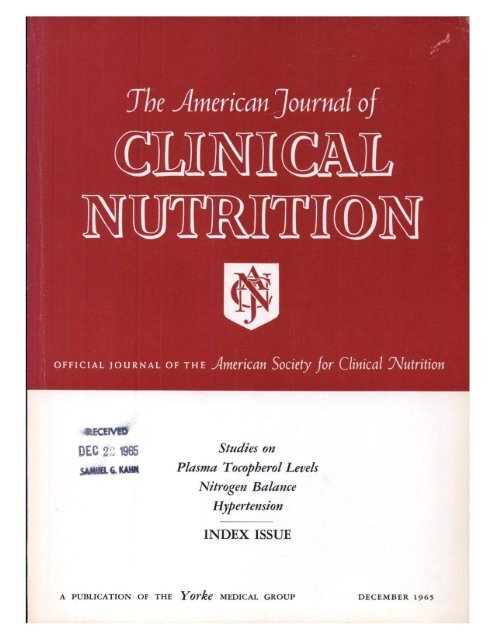Association of sociodemographic factors and a healthy and sustainable dietary pattern in adult population in Mexico, United States, and Canada: a cross-sectional study
IF 6.5
1区 医学
Q1 NUTRITION & DIETETICS
引用次数: 0
Abstract
Background
Evaluating diet in terms of health and environmental impact is crucial to transform current food systems to encourage a healthier and more sustainable approach.
Objectives
In this study, we analyzed the association between a healthy and sustainable dietary pattern and sociodemographic factors in adults from Mexico, the United States, and Canada.
Methods
This cross-sectional study included adults aged ≥20 y. We assessed the dietary quality on health and environment dimensions using the World Index for Sustainability and Health (WISH). Dietary information was collected using a 24-h recall from national surveys in Mexico, the United States, and Canada. Compliance with the recommendations of 13 food groups was estimated to obtain a total score of 130. Multiple linear regression models were used to estimate the association between the total score and sociodemographic factors.
Results
The total WISH score was low in Mexico (47.6 ± 0.78), Canada (44.2 ± 0.29), and the United States (41.3 ± 0.31). The highest scores in protective foods were whole grains (4.8 ± 0.25) in Mexico. In limiting foods, the lowest scores were: red meat (4.4 ± 0.10) and added sugars (3.0 ± 0.10) in the United States and saturated fat in Canada (5.5 ± 0.09). Being female [β: 2.4, 95% confidence interval (CI): 1.4, 3.5], or over 60 y old (β: 3.1, 95% CI: 1.8, 4.3) and having a higher educational level (β: 2.5, 95% CI: 1.4, 3.6) were associated with higher scores.
Conclusions
Mexico, the United States, and Canada have an unhealthy and high environmental impact dietary pattern. The groups with lower compliance are males, younger individuals, and those with lower educational attainment.
墨西哥、美国和加拿大成年人的社会人口因素与健康和可持续饮食模式的关系:一项横断面研究。
导言:从健康和环境影响的角度评估饮食对于改变当前的粮食系统以鼓励采用更健康和更可持续的方法至关重要。目的:在本研究中,我们分析了来自墨西哥、美国和加拿大的成年人健康和可持续饮食模式与社会人口因素之间的关系。方法:本横断面研究纳入年龄≥20岁的成年人。我们使用世界可持续性和健康指数(WISH)从健康和环境两个方面评估饮食质量。在墨西哥、美国和加拿大的全国调查中,通过24小时召回收集饮食信息。对13个食品组建议的遵守情况估计得到130分的总分。采用多元线性回归模型估计总分与社会人口学因素之间的相关性。结果:墨西哥(47.6±0.78)、加拿大(44.2±0.29)和美国(41.3±0.31)的WISH总分较低。在保护食品中得分最高的是墨西哥的全谷物(4.8±0.25),在限制食品中得分最低的是:美国的红肉(4.4±0.10)和添加糖(3.0±0.10),加拿大的饱和脂肪(5.5±0.09)。女性(β: 2.4, 95% CI 1.4, 3.5);或超过60岁(β: 3.1, 95% CI 1.8, 4.3)和具有较高的教育水平(β: 2.5, 95% CI 1.4, 3.6)与较高的得分相关。结论:墨西哥、美国和加拿大存在不健康的高环境影响饮食模式。依从性较低的群体是男性、年轻人和受教育程度较低的人。
本文章由计算机程序翻译,如有差异,请以英文原文为准。
求助全文
约1分钟内获得全文
求助全文
来源期刊
CiteScore
12.40
自引率
4.20%
发文量
332
审稿时长
38 days
期刊介绍:
American Journal of Clinical Nutrition is recognized as the most highly rated peer-reviewed, primary research journal in nutrition and dietetics.It focuses on publishing the latest research on various topics in nutrition, including but not limited to obesity, vitamins and minerals, nutrition and disease, and energy metabolism.
Purpose:
The purpose of AJCN is to:
Publish original research studies relevant to human and clinical nutrition.
Consider well-controlled clinical studies describing scientific mechanisms, efficacy, and safety of dietary interventions in the context of disease prevention or health benefits.
Encourage public health and epidemiologic studies relevant to human nutrition.
Promote innovative investigations of nutritional questions employing epigenetic, genomic, proteomic, and metabolomic approaches.
Include solicited editorials, book reviews, solicited or unsolicited review articles, invited controversy position papers, and letters to the Editor related to prior AJCN articles.
Peer Review Process:
All submitted material with scientific content undergoes peer review by the Editors or their designees before acceptance for publication.

 求助内容:
求助内容: 应助结果提醒方式:
应助结果提醒方式:


